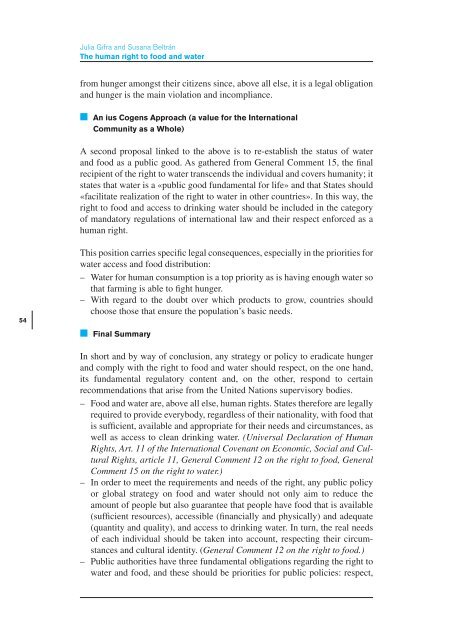Julia Gifra <strong>and</strong> Susana BeltránThe human right to food <strong>and</strong> waterThis focus aims to outline the <strong>global</strong> framework where any public policyinvolving human rights is to be carried out (96) . It aims for all policies <strong>and</strong> plansto take the duties <strong>and</strong> obligations set out in international law in the specificarea involved as a starting point. The adoption of this approach introduces twohighly useful aspects: firstly, it helps to define more clearly State obligationsregarding the main human rights principles involved in a strategy or policy.Secondly, this approach changes the logic that has guided the production ofpublic policies for decades, understood as more or less discretional services,that States carry out to meet the needs of their citizens. However, it introducesa fundamental change of outlook since public policies on the right to food (<strong>and</strong>the eradication of hunger) should not only be drafted from the confirmationof those in need being able to be helped or not in the context of a temporarypolitical commitment, but rather from the perspective that these individualshave rights, today <strong>and</strong> beyond 2015. In some way, this human rights approachin public policies tempers the importance of political discourse since food <strong>and</strong>the eradication of hunger is not only a voluntary commitment but a full legalobligation (97) . This means that, beyond 2015, States shall continue to put thesame energy <strong>and</strong> commitment into reducing the number of people suffering2007, pp. 1-47; A Human Rights’ Based Approach to Development, New perspectives bytaking cultural rights into account?, Synthesis Documents, Interdisciplinary Institute for Ethics<strong>and</strong> Human Rights, University of Fribourg, 23rd May 2011, pp. 1-7; UNESCO Strategy onHuman Rights, adopted by the 32nd session of the General Conference of UNESCO, 16thOctober 2003, resolution 32 C/27; Frequently Asked Questions on a Human Rights-basedApproach to Development Cooperation, Office of the United Nations High Commissioner forHuman Rights, 2006, pp. 1- 50.(96)Medina Rey, J.M., «La lucha contra el hambre desde el enfoque de los derechoseconómicos, sociales y culturales», in AA.VV., Seguridad alimentaria y políticas de luchacontra el hambre: seminario internacional sobre seguridad alimentaria y lucha contra elhambre, Chair of Studies in Hunger <strong>and</strong> Poverty, Servicio Publicaciones de la Universidadde Córdoba <strong>and</strong> Oficina de Cooperación Internacional al Desarrollo, Cordoba, 2006, pp.139-155.(97)This does not intend, not by far, to deny the importance of the political efforts <strong>and</strong>encouragement, such as the Millennium Development Goals or the Voluntary Guidelines ofthe FAO. In fact, regarding the MDGs, some state that the political, technical <strong>and</strong> quantitativedimension is its main advantage, since a temporary <strong>global</strong>-scope hunger reduction goal hasnever been set, based on supervising indicators taking into account <strong>global</strong> figures. See,Medina Rey, J.M., «La lucha contra el hambre desde el enfoque de los derechos económicos,sociales y culturales», in AA.VV., Seguridad alimentaria y políticas de lucha contra el hambre:seminario internacional sobre seguridad alimentaria y lucha contra el hambre, Chair ofStudies on Hunger <strong>and</strong> Poverty, Servicio Publicaciones de la Universidad de Córdoba <strong>and</strong>Oficina de Cooperación Internacional al Desarrollo, Cordoba, 2006, pp. 139-155.However, reiterating this recognition <strong>and</strong> without undermining the success it signifies, weshould qualify that the attainment of this goal cannot be realised outside the definition ofthe rights already set out in the International Human Rights Covenants. It is true that humanrights need precision <strong>and</strong> to be set as <strong>global</strong> targets, but this should not confuse or forgettheir nature. This means that, beyond 2015, States shall continue to put the same energy <strong>and</strong>commitment into reducing the number of people suffering from hunger amongst its citizenssince, above all else, it is a legal obligation <strong>and</strong> hunger is the main violation <strong>and</strong> incompliance.53
Julia Gifra <strong>and</strong> Susana BeltránThe human right to food <strong>and</strong> waterfrom hunger amongst their citizens since, above all else, it is a legal obligation<strong>and</strong> hunger is the main violation <strong>and</strong> incompliance.■■An ius Cogens Approach (a value for the InternationalCommunity as a Whole)A second proposal linked to the above is to re-establish the status of water<strong>and</strong> food as a public good. As gathered from General Comment 15, the finalrecipient of the right to water transcends the individual <strong>and</strong> covers humanity; itstates that water is a «public good fundamental for life» <strong>and</strong> that States should«facilitate realization of the right to water in other countries». In this way, theright to food <strong>and</strong> access to drinking water should be included in the categoryof m<strong>and</strong>atory regulations of international law <strong>and</strong> their respect enforced as ahuman right.54This position carries specific legal consequences, especially in the priorities forwater access <strong>and</strong> food distribution:––Water for human consumption is a top priority as is having enough water sothat farming is able to fight hunger.––With regard to the doubt over which products to grow, countries shouldchoose those that ensure the population’s basic needs.■■Final SummaryIn short <strong>and</strong> by way of conclusion, any strategy or policy to eradicate hunger<strong>and</strong> comply with the right to food <strong>and</strong> water should respect, on the one h<strong>and</strong>,its fundamental regulatory content <strong>and</strong>, on the other, respond to certainrecommendations that arise from the United Nations supervisory bodies.––<strong>Food</strong> <strong>and</strong> water are, above all else, human rights. States therefore are legallyrequired to provide everybody, regardless of their nationality, with food thatis sufficient, available <strong>and</strong> appropriate for their needs <strong>and</strong> circumstances, aswell as access to clean drinking water. (Universal Declaration of HumanRights, Art. 11 of the International Covenant on Economic, Social <strong>and</strong> CulturalRights, article 11, General Comment 12 on the right to food, GeneralComment 15 on the right to water.)––In order to meet the requirements <strong>and</strong> needs of the right, any public policyor <strong>global</strong> strategy on food <strong>and</strong> water should not only aim to reduce theamount of people but also guarantee that people have food that is available(sufficient resources), accessible (financially <strong>and</strong> physically) <strong>and</strong> adequate(quantity <strong>and</strong> quality), <strong>and</strong> access to drinking water. In turn, the real needsof each individual should be taken into account, respecting their circumstances<strong>and</strong> cultural identity. (General Comment 12 on the right to food.)––Public authorities have three fundamental obligations regarding the right towater <strong>and</strong> food, <strong>and</strong> these should be priorities for public policies: respect,
















